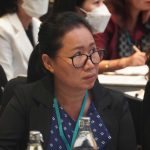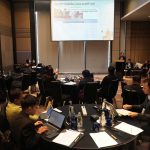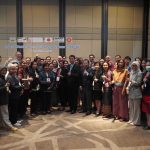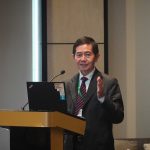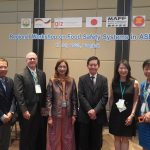The intensification of agricultural production to feed the growing population, unfortunately, link to the increased use of various agrochemicals. The overuse of pesticides has raised concerns on its adverse effects on human health and the environment.
The ASEAN Member States recognise these challenges and the need to strengthen coordinated actions in the region to promote safe use of agrochemicals as well as sustainable alternatives. To support these efforts and provide updates on regional initiatives, the Regional Workshop on Food Safety Systems in ASEAN on 17 July 2023 in Bangkok, Thailand, was convened with 46 participants from food safety’s experts and policymakers in the region.
The event was organised by the ASEAN Secretariat together with the Department of Agriculture, Thailand as the host, in collaboration with the ASEAN-MAFF Japan Project for Human Resources Development in Food-related Areas through Partnership with Universities in ASEAN Region (HRD Project) – Phase 3, and the ASEAN-German Cooperation project on Promotion of Sustainable Agricultural Value Chains in ASEAN (AgriTrade).
Joint efforts in promoting food safety in the region
ASEAN is actively promoting safe use of agrochemicals in the agriculture sector such as through implementing regulatory frameworks, promoting alternative pest control methods, and enhancing capacity building.

At the event, Dr Pham Quang Minh, Head of Food, Agriculture and Forestry Division of the ASEAN Secretariat, conveyed his appreciation to stakeholders gathered to address the topic on food safety which is a cross-cutting issue requiring joint efforts from stakeholders, including the private sector and international organisations.
He highlighted ASEAN on-going efforts in implementing sustainable agriculture as its key priority as seen in the recently published ASEAN Regional Guidelines for Sustainable Agriculture and the ASEAN Guidelines on Promoting Responsible Investment in Food, Agriculture and Forestry. Dr Minh briefly talked about the promotion of digital technologies in potentially contributing to agriculture productivity and food safety in the region. In addition, he shared that carbon emission reduction in the agriculture sector as one of the topics gaining focus in ASEAN.

Mr Hiroaki Kinoshita, Project Coordinator of HRD Project which is funded by Japan Ministry of Agriculture, Forestry and Fisheries, shared that food safety is a topic of great interest for Japan and highlighted the importance of cooperation among stakeholders across the region to promote sustainable agriculture practices.
Echoing the importance of supporting coordinated efforts in the region, Ms Pouchamarn Wongsanga, Regional Component Leader, ASEAN AgriTrade Project, shared the study supported under the project to stock-take the use of agrichemicals in the region which provided a set recommendation to overcome challenges in promoting compliance with ASEAN-harmonised Maximum Residue Limit (MRL) standards.
As the event’s host country, Thailand’s Department of Agriculture, represented by Deputy Director-General, Dr Pongthai Thaiyotin, opened the event. He emphasised the importance of the agriculture sector in the region and globally as an essential source of food supply, contributing to its population’s economy, livelihood and food security.
“As The Regional Workshop on Food Safety Systems in ASEAN aims to provide updates on global and regional development initiatives related to food safety systems, with various speakers providing valuable insights into the topic. This event will contribute to further strengthening our regional collaboration and the role of ASEAN in promoting the safe use of agrochemicals” he saidExperts and policymakers across the region shared practices and lessons learned from ASEAN and Japan to improve food safety, including perspectives from the industry and consumer.
Experiences and lessons shared from the workshop on approaches to reduce risk of pesticides, and promoting awareness on food safety and safe use of agrochemicals will help shape future joint activities in the region to improve food safety. ■







